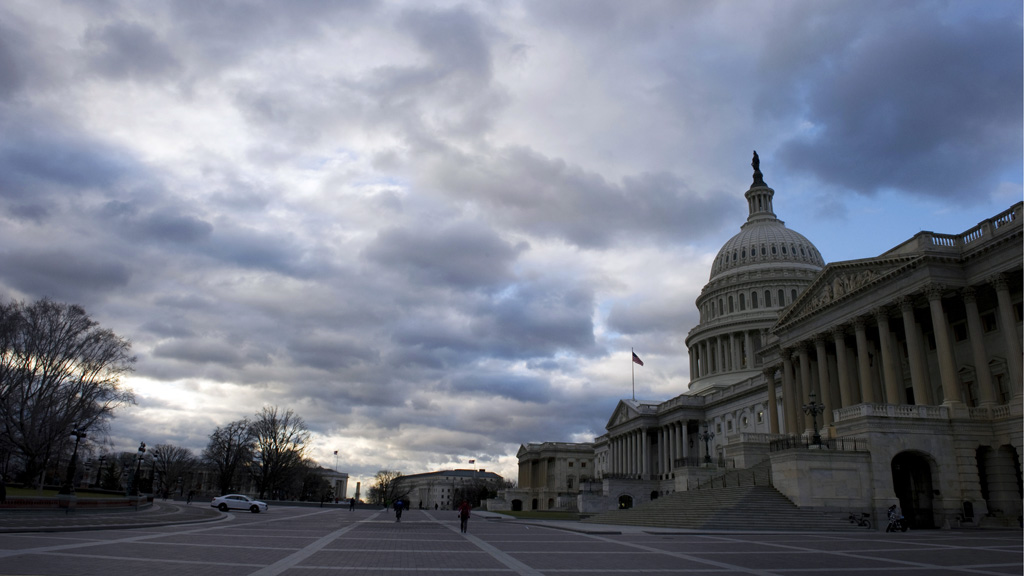Fiscal cliff: hours to go as US economy on the brink
US Congressional leaders are scrambling to clinch a last-minute deal to avoid falling off the fiscal cliff and save America’s economy from crippling tax rises and spending cuts.

With just hours to go before the clock strikes midnight – the deadline to broker a deal – senators will today continue to seek a compromise deal to send to the US House of Representatives.
Without a deal, $600bn in tax rises and spending cuts are due to kick in for the United States from 1 January – which would be likely to push the nation into recession, with grave consequences for the global economy.
For ordinary Americans, falling off the so-called “fiscal cliff” could lead to two million long-term unemployed people losing their benefits, and tax rises for 88 per cent of citizens.
Last night, Harry Reid, the Democratic senate majority leader, and Mitch McConnell, who leads the chamber’s Republican minority, left another day of talks with negotiations at a standstill.
On Monday, US senator Jon Kyl on Monday said a “lot of progress” has been made in talks to avert the fiscal cliff but cautioned that it is unclear if the progress will spur legislation the Senate can vote on before a midnight US deadline (5am GMT).
“There is no agreement yet,” Kyl said. “Conversations are still ongoing. There has been a lot of progress.”
Asked how long talks could go on, Kyl said: “I guess until 11:59.”
Fallback plan
At the heart of the debate lie differences between the two parties over how to avoid the fiscal cliff, with tax increases being the main sticking point.
Republicans say that those earning more than $400,000 should pay more, but Democrats propose tax rises for those earning above $250,000. Republicans have also demanded larger cuts in spending than those offered by President Barack Obama.
Any resolution in the tug-of-war over taxes and spending cuts forged in the Senate would need to win approval in the House of Representatives and the outcome in that chamber remains uncertain.
“Republicans in the House do not want to raise tax rates without some significant spending cuts, and the Senate apparently has abandoned a proposal to trim cost-of-living adjustments in the social security pension program,” said Greg Valliere, chief political strategist at Potomac Research Group.
“So, while the Senate stumbles toward a potential compromise, there’s absolutely no assurance that it could pass later this week in the House,” he said.
What is the fiscal cliff? Your questions answered
Obama has offered a fallback plan for senators to vote on in case the two sides fail to agree by the deadline, of renewing tax cuts on income below $250,000 and extending unemployment benefits. His plan, however, does not address the spending cuts.
Failure to reach an agreement would mean that spending cuts and higher taxes – as Bush-era tax reductions come to an end – would kick in from Tuesday 1 January, and analysts say that would lead to a reduction in consumer spending power.
Last ditch appeal
Yesterday, President Obama made a last-ditch televised appeal to the nation, saying that the priority was to ensure taxes do not rise for middle-class families. It would, he said, “hurt our economy badly.”
“That’s something we all agree on,” he said. “If we can get that done, that takes a big bite out of the fiscal cliff.”
He also warned that failure to reach agreement would send shockwaves through the markets.
-
Latest news
-
‘I violated my moral compass working for Trump,’ former lawyer testifies3m

-
Working class creatives in film and TV at lowest level in decade5m

-
Israeli police investigating attack on Gaza aid convoy4m

-
Biden announces major tariff increase on Chinese-imported green tech3m

-
‘If NHS can afford it, people with obesity should have Semaglutide,’ says weight loss expert5m

-




